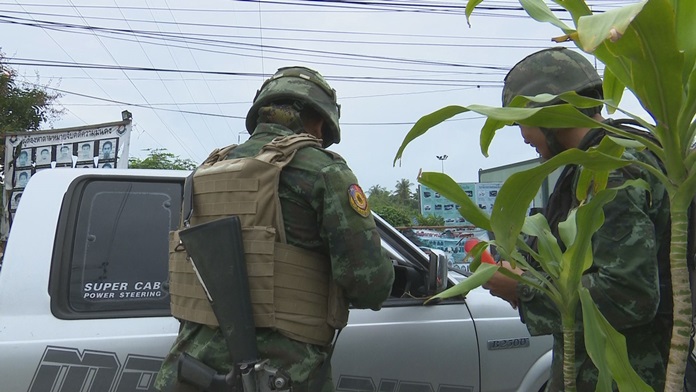Hat Yai (AP) — Gunmen presumed to be Muslim insurgents stormed a Buddhist temple in southern Thailand, killing two monks and wounding two others, police said Saturday.
The Friday night attack in Narathiwat province was the latest in a recent upsurge of violence in the area, which since 2004 has been plagued by a separatist insurgency that has claimed about 7,000 lives.
Witnesses described seeing armed men arrive at the temple on motorcycles, open fire with automatic weapons and then storm inside where they shot the monks in their quarters, according to a news report. One of those killed was the temple’s abbot.
The temple attack was one of several violent incidents in Narathiwat on Friday, including a roadside bombing that wounded five members of security forces, and a shootout between paramilitary rangers and five armed men that left one of the gunmen dead. The others escaped.
The attacks have occurred during an effort to revitalize peace talks between the government and some insurgent groups, and may be an effort to scuttle them by stoking popular outrage and inviting heavy handed retaliation. Analysts say the most militant group, the Barisan Revolusi Nasional, BRN, is not taking part in the talks.
The New York-based group Human Rights Watch has pinned the blame for the ongoing violence on the BRN.
“The ghastly attack on Buddhist monks by insurgents in Thailand’s deep south is morally reprehensible and a war crime, and those responsible should be held to account,” said Brad Adams, Asia director at Human Rights Watch. “The insurgents’ 15-year campaign of deliberately attacking Buddhist and Muslim civilians can’t be justified.”
The watchdog said that since the insurgency flared up in January 2004, BRN’s members have targeted Buddhist temples and monks because they consider them emblematic of the Thai Buddhist state’s “occupation” of ethnic Malay Muslim territory. At least 23 monks have been killed and more than 20 wounded, it said.
The insurgents have also targeted security personnel assigned to provide monks safe passage to and from the temples, it said.
There is fear that attacks on temples could trigger vigilante action by Buddhist civilians against Muslims.
“This is a very brazen act to drive a wedge among people,” Pornpen Khongkachonkiet, a human rights defender, told The Associated Press. “The cause of the conflict in the south is originally between the government and locals. But this is an attempt to turn the conflict to be between two religions,” she added.
She said there are victims on both sides, noting that on Jan. 11, an Imam — a Muslim community leader — was gunned down. A lack of transparency in the judicial system makes it difficult to assign blame for the violence, said Pornpen, who also heads the Cross Cultural Foundation, which monitors and documents cases of torture and ill-treatment.
Prime Minister Prayuth Chan-ocha condemned the violence and ordered security officers to find the culprits, said government spokesman Puttipong Punnakanta.





